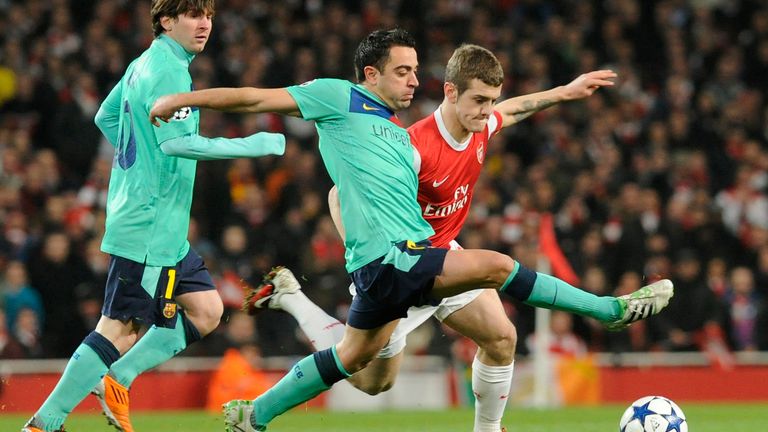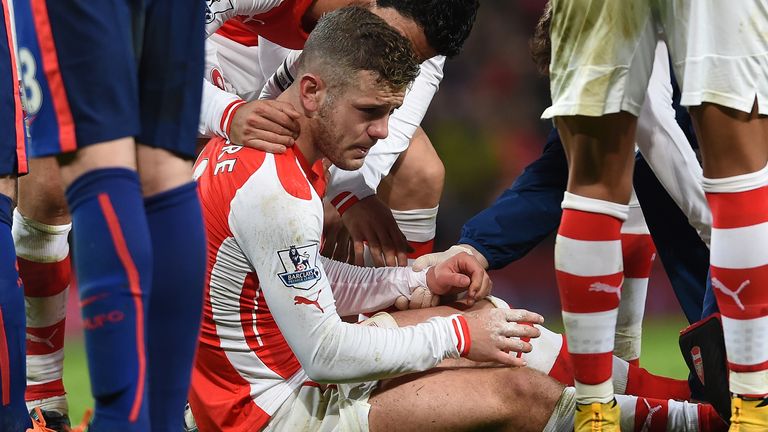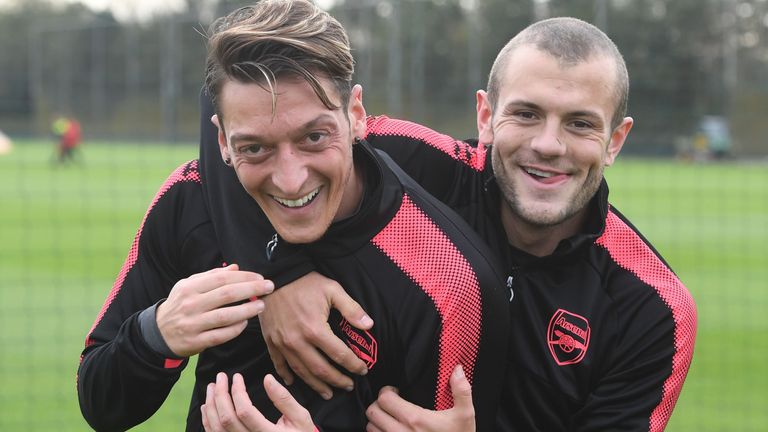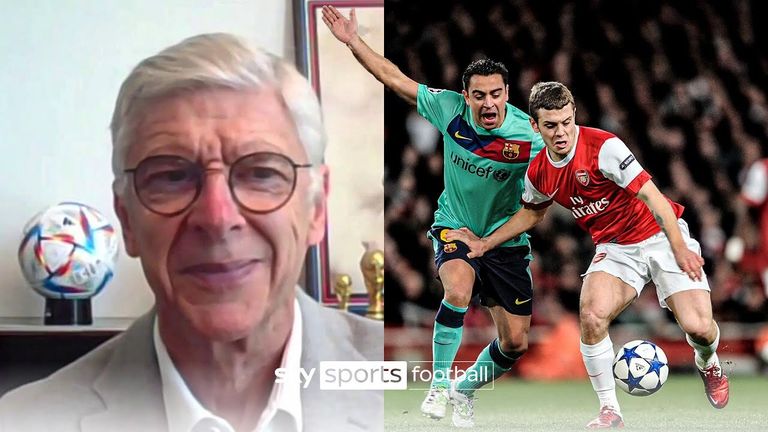Jack Wilshere: Former Arsenal, England midfielder retires at 30 but memories of his thrilling talent will endure
Jack Wilshere has announced his retirement from football; former Arsenal and England midfielder grateful for "unbelievable journey" and "incredible moments" but his career was dogged by injuries following his sensational breakthrough as a teenager
Sunday 17 July 2022 08:09, UK
It is a sad end to a career that promised so much but memories of Jack Wilshere's thrilling talent will endure - especially to those who witnessed his mesmerising performance in Arsenal's 2-1 win over Pep Guardiola's Barcelona in February of 2011.
Wilshere had only turned 19 a month earlier. He stepped out at the Emirates Stadium that night as the youngest player on the pitch. But what followed, against perhaps the greatest club side in history, was an exhibition in fearlessness and technical brilliance.
There he was, on his own at the base of midfield, spinning past Andres Iniesta and Lionel Messi. There he was, haring after Xavi Hernandez and Sergio Busquets, then motoring away from them, ball, crowd and opponent all under his spell.
By the end, he had completed 43 out of 46 passes - including the one to release Cesc Fabregas in the build-up to Andrey Arshavin's memorable winner - while only Messi had made more dribbles.
- Jack Wilshere announces retirement | 'I lived my dream'
- Premier League ins and outs | Papers - Latest headlines
- Transfer Centre LIVE! | Get Sky Sports - Latest offers
Control. Composure. Quality. It was all there in swathes.
Wilshere was named man of the match, his tantalising potential brilliantly displayed on a global stage and his performance, in front of adoring supporters, immediately entering Arsenal folklore.
Fabregas, his partner in Arsenal's midfield that night, described him as "one of the most talented players I've ever played with" while Arsene Wenger, the manager whose faith he had so rewarded, said he could become "one of the best in the world".
Wilshere had, of course, already emerged as a key figure for Wenger at that point, becoming the second-youngest player in Arsenal's history when making his debut at 16 three years earlier, then returning from a loan spell at Bolton ready to establish himself.
He did so in majestic style, featuring in all but three of Arsenal's Premier League games over the course of his breakout season and playing more Champions League minutes than any of his team-mates.
Fabio Capello, the man who had given Wilshere his international debut at the start of that season, labelled him England's "future" - even if the Italian wasn't himself. "Spanish technique but an English heart," was Wenger's description.
Here, at last, was precisely the kind of midfielder this country had lacked for so long and the accolades soon followed. PFA Young Player of the Year. A place in the PFA Team of the Year too.
Thinking back to those exhilarating beginnings, it is easy to understand why Wilshere has found it, in his words, "difficult to accept" the circumstances which have led him to call time on his career at 30.
That night against Barcelona was just one of many highs. Wilshere captained Arsenal and won two FA Cups. As well as delivering one of the Emirates Stadium's best individual performances, he scored perhaps its greatest goal with his stunning strike against Norwich in 2013. For England, there were 34 appearances and two goals.
Wilshere describes those achievements as "beyond his wildest dreams" as a young boy growing up in the Hertfordshire town of Hitchin. But the extent of his talent means there is no escaping the feeling that there should have been so much more.
The spectre of injury emerged with cruel timing, a stress fracture of his right ankle in a friendly against New York Red Bulls in July 2011 denying him the chance to build on his breakthrough campaign.
Wilshere was expected to miss "four to five months" after undergoing surgery that September but complications emerged and the recovery proved far slower than anticipated.
Wilshere ended up watching the entirety of the 2011/12 season from the sidelines and a player once earmarked for a key role at Euro 2012 found himself watching the tournament from afar.
When he did finally make his return to action, in a Premier League meeting with QPR at the Emirates Stadium in October 2012, he had gone 524 days without playing.
"It was a long journey," he said afterwards.
Sadly, it was one he would find himself repeating.
He made 33 appearances in all competitions that season and 35 in the next, but misfortune struck again in March 2014, another fracture, this time to his foot.
It was a testament to Wilshere's determination that he initially played on after suffering that injury, shrugging it off as "just a bruise" after coming through an hour of an England friendly against Denmark.
But the reality was inescapable. Wilshere would recover in time to help Arsenal win the 2014 FA Cup before featuring at that summer's World Cup in Brazil, but more frustration followed in the form of more ankle problems in the subsequent season.
His ability to draw fouls was part of what made him such a thrilling player to watch but the late challenges took a toll.
Again, Wilshere returned in time to play a part in Arsenal's FA Cup final win over Aston Villa, this time following it up with a memorable two-goal performance for England in a European Qualifying win over Slovenia in Ljubljana.
But the pattern of his career remained the same.
Wilshere managed just three appearances across the 2015/16 season and while he did feature more prominently in 2017/18, making 35 appearances in all competitions for Arsenal following a successful loan spell with Bournemouth in 2016/17, it proved to be his last at the Emirates Stadium.
A move to West Ham was one Wilshere would later admit to regretting and it brought more ill fortune, injuries again restricting his playing time. After a second loan at Bournemouth and a short spell with AGF in Denmark, Wilshere reached a point he had long dreaded.
"In truth it has been difficult to accept that my career has been slipping away in recent times due to reasons outside of my control whilst feeling that I have still had so much to give," he said.
"However, having had time to reflect and talk with those closest with me I know that now is the right time and, despite the difficult moments, I look back on my career with great pride at what I have achieved."
Wilshere's goodbye is of course tinged with sadness but he is right to feel pride at his achievements. For the rest of us, the memories of Jack Wilshere, that impudent teenager so at home among the world's best that night at the Emirates Stadium, will live on.
Wenger hails 'exceptional talent' Wilshere
Arsene Wenger on Sky Sports News:
"Well for me it is a sad moment. Jack is an exceptional football player, he has first not to thank us but himself as he was brave, talented, not scared of anybody and that is why we thought he could start from such a young age.
"He started in 2008 when he must have been 16 years old and that is, of course, exceptional at that level and straight away he has shown the quality to be a main player. And he stops at 2022 when he is 30 years of age and for a midfielder and a technical player, that is a fantastic age.
"And that sums up a little bit what Jack's career was - exceptional talent, but did not play enough games because of injuries and that is why in the end he stopped as it is very difficult when you are a star like he was and you cannot play at your best anymore and that is very difficult to swallow.
"You lose confidence and that is why he took the right decision, I believe as well that he has a coaching career in front of him, the fact that he could not go to the end of his potential might help him to be motivated to make a great coaching career. That is what I wish.
"Jack could unlock the game with his short passing, but also to unlock the game with his capacity to pass people one versus one and turn the game forward when you have no solutions.
"Jack started as a winger at a young age and he brought that into his midfield and could pass people and unlock the game. He was also not inhibited and not impressed or scared by anybody and not afraid of the big stage, he almost thought it was natural for him to be there.
"The Barcelona games for me were very special as Barcelona were, of course, a reference for us at the time and to see how we passed through players and how well he performed at that level - for me at that time the Barcelona team was the best in the world - then to see him perform at that level with such a quality convinced you that he is part of the best in the world.
"And with England as well he very quickly became an obvious choice and candidate.
"First of all, he has a great understanding of the game, I feel a midfield position suits well the development of a coach. After that, he is brave, he has good communication skills, he is honest and is intelligent. And overall on top of that, he certainly finishes his career frustrated and if he manages to transform that frustration into motivation to show how good he is at football, then I think he can have a promising career as a coach."









